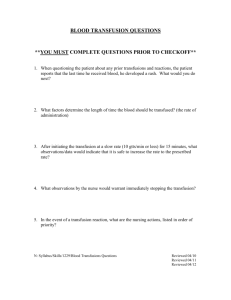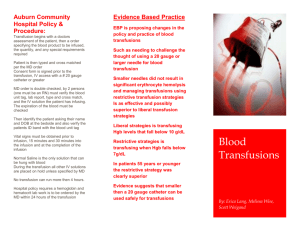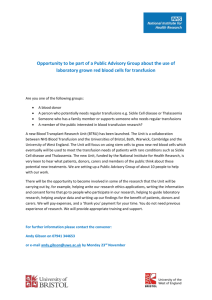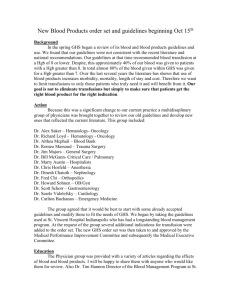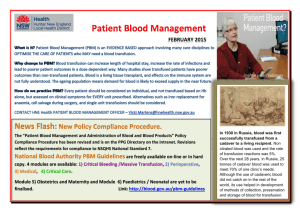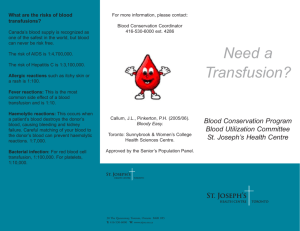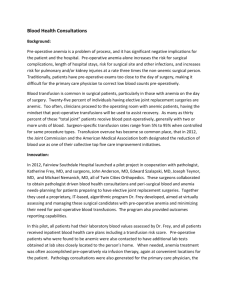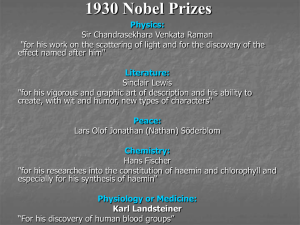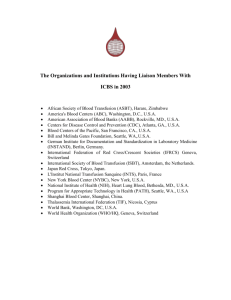Blood Transfusion in the Newborn
advertisement
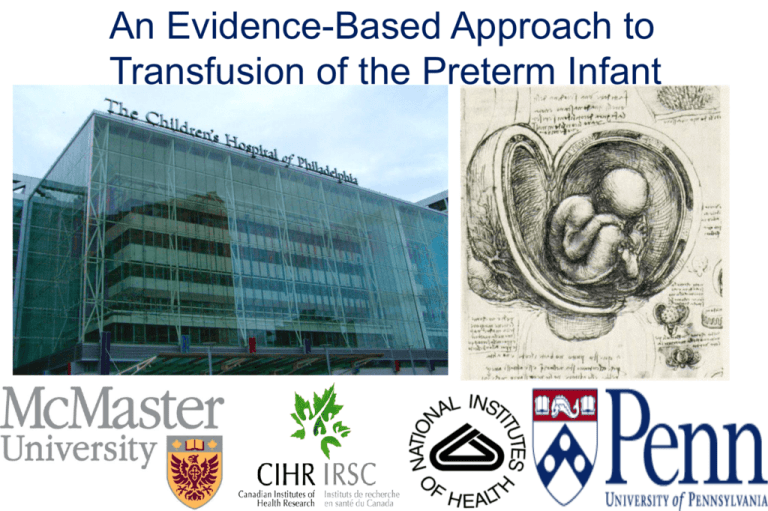
An Evidence-Based Approach to Transfusion of the Preterm Infant Disclosure I am on the speakers bureau for: Ikari and Fisher Paykell Anemia of Prematurity 1. ANEMIA Definitions Clinical burden and effects Risk : benefit ratio 2. REDUCING TRANSFUSION Placental transfusion Minimizing iatrogenic anemia Erythropoietin 3. WHAT HEMOGLOBIN TRIGGERS TO USE? Randomized Trial Data Hemoglobin and reticulocytes during first year of life Lundstrom 1977 Saarnen and Siimes 1978 Cited by: Dallman PR 1981 “Rapid developmental changes and complex interactions for oxygen delivery (prevent) developing clear cut criteria for transfusion. Consequently clinical practices vary widely.’’ International survey of transfusion practices for extremely premature infants. Guillén U Sem Perinatol 2012;36:244 Risk : benefit ratio of transfusions Higher hemoglobin may improve oxygen transport cardiac output weight gain apnea BUT may increase infections - donor related iron stores necrotising enterocolitis children & adults - death rates complications from “old blood” Pre Tx 97-113 g/l Pre Tx 97-113 g/l Pre Tx Hgb<97 Pre Tx 113-129 g/l Pre Tx Hgb<97 Pre Tx 113-129 g/l (J Pediatr 2014;164:475-80). Intra-hospital death to day 28 in 1077 infants with BW < 1500 g Transfused Non-Transfused Red Blood cell transfusions are independently associated with intrahospital mortality in VLBW: J Pediatrics 2011; 159; 371 Do transfusions cause NEC? Kirpalani H, Zupancic JA. Sem Perinatol 2012 36:269; Whyte R, Kirpalani H. Low vs high haemoglobin threshold for blood transfusion in very low birth weight infants. Cochrane Database Syst Rev. 2011:CD000512 RCT Data More NEC with restrictive transfusions Favours Restrictive Favours Liberal Do transfusions cause NEC? Kirpalani H, Zupancic JA. Sem Perinatol 2012 36:269 Observational Studies OR of 7.5 is implausibly high More NEC with liberal transfusions Favours Liberal Favours Restrictive Anemia of Prematurity 1. ANEMIA Definitions Clinical burden and effects Risk : benefit ratio 2. REDUCING TRANSFUSION Placental transfusion Minimizing iatrogenic anemia Erythropoietin 3. WHAT HEMOGLOBIN TRIGGERS TO USE? Randomized Trial Data Effects of placental transfusion in ELBW: long and short-term outcomes Ghavam S, Batra D, Mercer J, Kugelman A, Hosono S, Oh W, Rabe H, Kirpalani H. Transfusion. 2014;54:1192 Phlebotomy overdraw in the neonatal intensive care nursery. Lin JC, et al: Pediatrics. 2000;106(2) . Early Erythropoietin. Ohlsson A, Aher SM. Cochrane 2014 4:CD004863. OUTCOME:Transfusions 614 Infants 862 Infants RR 1.48 (1.02, 2.13) RR 0.79 (0.73, 0.84) Favours ROP > Stage 3 EPO Control Favours EPO Control Anemia of Prematurity 1. ANEMIA - Definitions - Clinical burden and effects - Risk : benefit ratio 2. REDUCING TRANSFUSION - Placental Transfusion - Minimizing iatrogenic anemia - Erythropoietin 3. WHAT HEMOGLOBIN TRIGGERS TO USE? - Randomized Trial Data Comparison of Trial Design Iowa Trial Restrictive Participating centers Liberal PINT Trial Restrictive Liberal 1 10 100 451 Treatment allocation Randomized Randomized Stratification Birth weight Birth weight, center No. of subjects Mean BW (g) 954 958 771 769 Mean GA (wk) 28 28 26 26 PICOT Iowa Population <32 wks GA Intervention Comparison Outcomes Time frame Liberal Hgb Tx Restrictive Hgb Tx No. of RBC Tx 36 wks PMA PRIMARY OUTCOME IOWA Number of Transfusions Low Hgb High Hgb 3.3 + 2.9 5.2 + 4.5 p = 0.025 ADDITIONAL OUTCOMES IN IOWA STUDY J Pediatr 2006:149; 301 PICOT PINT Population Intervention Comparison Outcomes Time frame <1000 g BW Liberal Hgb Tx Restrictive Hgb Tx Intact Survival 36 wks PMA < 1000 g BW < 48 hours age < 31 wks GA TRANSFUSION THRESHOLDS Respiratory support Yes No Age High Low High Low Week one 135 115 120 100 Week two 120 100 100 85 ≥ Week three 100 85 75 85 PRIMARY OUTCOME PINT Death, BPD, severe ROP, Brain Injury Low Hgb High Hgb 165/223 (74%) 159/228 (70%) OR = 1.3 95% CI 0.8-2.0 p = 0.26 PINT-Outcome Study (PINT-OS) Primary Outcome & a-priori components 0.1 1 Composite 10 OR 100 p=0.09 1.45 (0.94, 2.21) 1.18 (0.72,1.93) Death 1.32 (0.53, 3.27) Cerebral Palsy Cognitive Delay <70 p=0.06 1.74 (0.98, 3.11) Blindness 2.16 (0.19, 24.1) Deafness 1.45 (0.32, 6.58) Favors Low Favors High PINT-Outcome Study (PINT-OS) Post-Hoc Secondary Analysis 0.1 1 Composite 10 100 p=0.013 Death Cerebral Palsy Cognitive Delay <85 p=0.016 Blindness Deafness Favors Low Favors High OR 1.71 1.12, 2.61 1.18 0.72 , 1.93 1.32 0.53 , 3.27 1.81 1.12,2.93 2.16 0.19 , 24.1 1.45 0.32 , 6.58 RCT era: Risk : benefit ratio of transfusions Higher hemoglobin may improve oxygen transport cardiac output weight gain - Not true apnea - Not true NEC ? Neurocognitive outcomes ? BUT may increase or unknown Infections - donor related iron stores death rates - unlikely WHEN SHOULD WE TRANSFUSE? NICHD – NEONATAL RESEARCH NETWORK Transfusions For Prematures (TOP) Does a Liberal Red Blood Cell Transfusion Strategy Improve Neurologically-Intact Survival of ELBW Infants as Compared to a Restrictive Strategy? Clinicaltrials.gov NCT01702805 1. Low thresholds of PINT and Iowa studies were comparable 2. It is reasonable to maintain infants above these lower thresholds 3. The high threshold was higher in Iowa than in PINT 4. The benefit of higher thresholds remains uncertain 16th Century dissection
